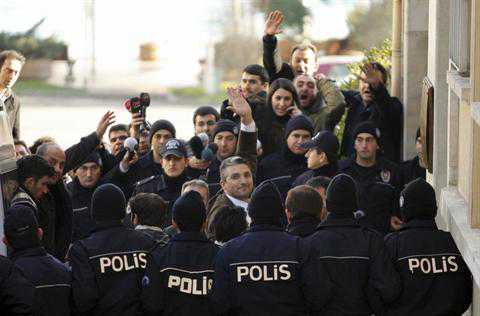December 15, 2011 12:54 AM
By Justin Vela
The Daily Star

Journalists Nedim Sener (C) and Ahmet Sik (facing camera, 3rd L) wave upon arrival at a courthouse in Istanbul in this March 5, 2011 file photo. (REUTERS/Ozan Guzelce/Milliyet/Handout/Files)
ISTANBUL: Turkish journalists Ahmet Sik and Nedim Sener will face their second court hearing this month, nearly eight months after being arrested for aiding a “deep-state” group of coup-plotters who aimed to topple the ruling Justice and Development Party (AKP).
Currently, there are some 70 journalists jailed in Turkey. Yet the case exposes new fault lines emerging in Turkey.
Celebrated for their investigative work, at the time of their arrests the journalists were investigating a shadowy Islamic group known as the Gulen Movement, founded in the 1960s by Turkish cleric Fethullah Gulen, who left Turkey for the United States in 1998.
While health reasons were cited for his departure, at the time he was likely to be tried over recordings in which he said, “Our friends who have positions in legislative and administrative bodies should learn its details and be vigilant all the time so that they can transform it and be more fruitful on behalf of Islam … However, they should wait until the conditions become more favorable … they should not come out too early.”
Gulen later claimed his words were taken out of context. He was tried in absentia on charges of trying to overthrow the secular state and acquitted in 2006. He is now free to return to Turkey, but remains living with followers in rural Pennsylvania.
The movement has grown into an international fraternity of schools, business associations, media outlets, and NGOs.
“They are powerful in Turkey and powerful abroad,” said Faik Tunay, an opposition parliamentarian with the People’s Republican Party (CHP).
He had visited Gulen schools in the Balkans and Central Asia and said that the students studying in the schools were the children of politicians and powerful business people.
Gulenists are also present in key positions within the education and interior ministries, police force, judiciary, and upper echelons of government, say many Turkey experts.
In April, hundreds of students protested in Istanbul when allegations surfaced that Gulenist students were being given the answers to exams for top universities and jobs within the state bureaucracy.
Prior to his arrest, Sik had completed a book called “The Imam’s Army,” which detailed allegations of how the movement sought to cover up its infiltration of the police force during an internal investigation. In March Istanbul police raided a printing house, confiscating the unpublished manuscripts in what press freedom organizations called “astonishing” censorship.
The book was widely circulated on the Internet.
For decades, the country’s powerful military considered itself the “deep state” or protectors of Turkey’s national identity. However, the so-called Ergenekon case, under which Sik and Sener are being tried, sparked a flurry of arrests, and led to the July resignations of Turkey’s top military commanders. AKP had proven able to control the military, which had ousted unfavorable governments in 1960, 1971, 1980 and 1997.
“With Ergenekon, the government tried to clean up the deep state, but they’ve created another deep state,” said Turkish journalist Ertugrul Mavioglu, who had investigated the movement.
While AKP, led by Turkey’s charismatic Prime Minister Recep Tayyip Erdogan, was immensely popular, the party could not have survived in power and tempered the military’s power alone, Mavioglu claimed.
“Congratulations to our brothers who support us beyond the ocean,” Erdogan said following AKP’s victory in a 2010 referendum on constitutional amendments, in what was widely reported as his first open reference to the Gulenists.
While senior members of AKP were previously members of Islamist parties, it was only when they began to feel threatened by the military did they join forces with the Gulenists, who had a strong hold over the country’s bureaucracy, Mavioglu said.
“They are not in the same groups because in the past they had a very different way, but they support each other.”
Now, the Gulenists allegedly aim to increase the wealth of its members, who are still not among the top ten richest people in Turkey, according to a source who did not wish to be named because of the sensitivity of the subject.
They also aim to gain further influence in media and entertainment. The recently released movie Allah’s Devoted Servant, a children’s animation film that aims to educate Turks about the Islamic philosopher that inspired Gulen.
Some say Gulen merely promotes a moderate form of Sunni Islam.
Sahin Alpay, a columnist at Zaman, a newspaper considered to be a mouthpiece of the movement, described it as a “faith-based” movement.
“It’s playing a rather important role in supporting the idea of a free and democratic Turkey,” he said. “They are playing a very positive role in building bridges between Turkey and the outside world.”
He claimed the movement had schools in 120 countries. “The schools also serve to establish trade and commercial ties,” he said. “They playing an important role in supporting an open society and open economy in Turkey.”
He said he viewed the movement “very positively,” but said he was not a member.
Galip Ensarioglu, an AKP parliamentarian from Diyarbakir said the movement is “ a very important movement for Turkey.”
“Of course there are connections between AKP and the Gulen movement,” he said.
“Both are based on the support of the same citizens. Of course, the AKP doesn’t want to share its sovereignty with the Gulen movement. AKP supports them because they support education and health. After that they don’t support them if they act like a different state or another power. “
Tunay, the opposition parliamentarian, said the biggest threat the Gulenists pose was an increased polarization in society between those that want a more Islamic Turkey and those that don’t.
A version of this article appeared in the print edition of The Daily Star on December 15, 2011, on page 8.
Read more:
(The Daily Star :: Lebanon News :: http://www.dailystar.com.lb)

Leave a Reply